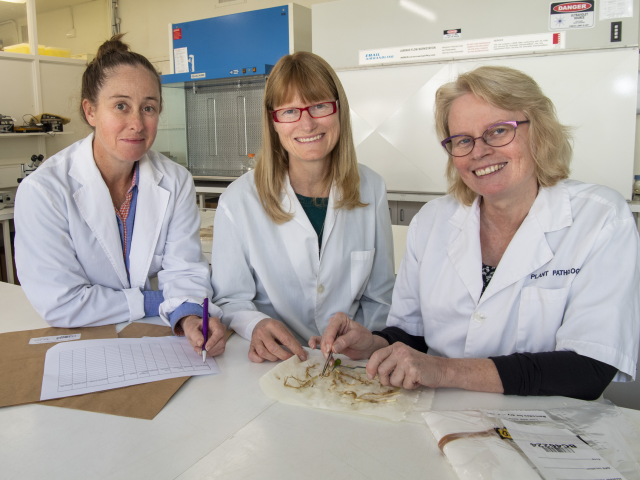Call for plant samples from poorly growing pulses and oilseeds
Frost ID Guide for Canola and Pulses hot off the press
The effects of varying temperatures on wheat powdery mildew
Milling oats an option for paddocks with crown rot
Call for plant samples from poorly growing pulses and oilseeds

Western Australian growers and agronomists are encouraged to get involved in a national survey of root diseases and pests of pulses and oilseeds.
The Department of Primary Industries and Regional Development (DPIRD) is seeking samples from canola, lupins, chickpea, field pea, lentil, vetch and faba bean crops experiencing poor establishment or growth.
The national survey, coordinated through the South Australian Research and Development Institute (SARDI), is part of the national ‘Soilborne disease interaction in Australian farming systems’ project, with co-investment by the Grains Research and Development Corporation.
This survey aims to assist in the better diagnosis and management of root diseases, and pests of pulse and oilseed crops.
As the level of grower interest in pulses and oilseeds is increasing and the crops are grown more frequently, the risk from soilborne diseases is growing.
The national survey will use a combination of visual identification and existing DNA tests to determine which of the known pathogens are most commonly associated with poor performing pulse and oilseed crops.
Next generation sequencing methods will be used to check for new emerging pathogens.
Soilborne pathogens often occur in disease complexes, and the most damaging pathogens could be difficult to isolate. If a test is not available or researchers are unaware of which pathogens to look for, they may not be detected.
DPIRD encourages WA growers with a pulse or oilseed crop with poor establishment, or growing poorly in winter or spring, to contact technical officer Miriam Connor on +61 (0)8 9368 3579.
A sampling kit including simple instructions on how to take a sample will be provided, and samples received by DPIRD will be washed, photographed, and rated for damage from pests or pathogens, then sent to SARDI for molecular testing.
Each sample will also be analysed using a research panel of 23 tests for known pulse and oilseed pathogens.
Test results will be communicated to participants free of charge, providing growers and their agronomists with knowledge of what may be impacting their crop to assist in future management decisions.
Information generated by the survey will be used to develop tests for new pathogens which can be added to PREDICTA® B, the DNA-based testing service developed by SARDI Molecular Diagnostic Centre.
